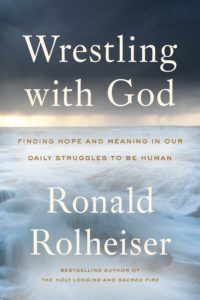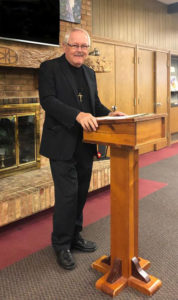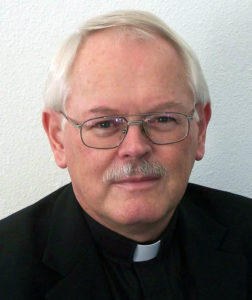Known for his humour, candor and wisdom, Ron Rolheiser is a sought-after speaker in the area of contemporary spirituality. He grew up in a large, loving family on a farm in Saskatchewan, and was ordained to the priesthood in 1972. Rolheiser is currently President of the Oblate School of Theology in San Antonio, Texas, and is the author of over 15 other books, including the bestselling The Holy Longing. His latest books include Wrestling with God, Domestic Monastery and Bruised & Wounded: Struggling to Understand Suicide. Rolheiser also writes a popular column that appears in many Catholic newspapers worldwide. Lately he has been exploring, writing and speaking about the possible pitfalls we all face as we age. We were delighted to spend some time with this widely-respected theologian and wonderful storyteller, discussing the challenges of the second half of life.
Here are some audio highlights of our conversation with Ron Rolheiser, with thanks to Gillicuddy for sharing his music. (3:10)
Interview by Laura Locke
Kolbe Times: Thank you very much for talking with us today. You’ve been writing and speaking lately on the struggles we face in the second half of life. I just finished reading your recent book Wrestling with God, and a while back I read your book from 2014 Sacred Fire. May I just say how much I enjoyed and appreciated them both, and also that I found them very valuable. We also got to hear you speak in Cochrane, Alberta this past August when you were up this way. There were also many things in your talk that I found very helpful, especially when you spoke about the seven ‘movements’ in the second half of life – movements of our hearts and spirits toward a new way of being. Perhaps you could say a few words about each of these seven ‘movements’ in turn, and unpack them for us a little.
First of all, is there anything you’d like to say by way of introduction?
Ron Rolheiser: Yes – just this. In the second half of life, our struggles are  often very different than the first half of life. And you can see this, biblically, in the parable of the prodigal son and the older brother. Notice, there are two brothers, but they’re struggling. The younger son is struggling with all the things of the world – ambition, travel, lust, whatever – while the older brother is struggling much more with anger and coming to peace inside of himself. The second half of life has a lot more to do with anger, with unresolved tensions, with disappointments, with bitterness and so on. That’s a much greater struggle.
often very different than the first half of life. And you can see this, biblically, in the parable of the prodigal son and the older brother. Notice, there are two brothers, but they’re struggling. The younger son is struggling with all the things of the world – ambition, travel, lust, whatever – while the older brother is struggling much more with anger and coming to peace inside of himself. The second half of life has a lot more to do with anger, with unresolved tensions, with disappointments, with bitterness and so on. That’s a much greater struggle.
Somebody once said that you spend the first half of your life struggling with the sixth commandment, ‘Thou shalt not commit adultery’ – and the second half of your life struggling with the fifth commandment, ‘Thou shalt not kill’. It’s kind of an old quip, but there’s some truth to it.
Kolbe Times: : The first ‘movement’ that you mentioned is from resentment to gratitude.
Ron Rolheiser: When we’re in the second half of life, we know our wounds. We know our faults. We know where life has disappointed us and often times we experience real resentment. But there’s no happiness in resentment. Happiness is in gratitude. I like to use a quote from the author Morris West, who wrote that, on your 70th birthday, you should have only three phrases left in your vocabulary: “Thank you. Thank you. Thank you.” If those phrases are not there, then you still have a lot of inner work to do. I believe that. We’re all going to end up with disappointments and wounds in life that we’re going to feel some resentment about, but that’s not what we want to carry as our dominant attitude.
Kolbe Times: The second ‘movement’ is related, isn’t it…from bitterness to forgiveness.
Ron Rolheiser: Yes – and it’s tied to the first one with this nuance: the way to give up resentment and get to a place of gratitude is by the road of forgiveness. I like to use the example of the book by Frankie McCourt called Angela’s Ashes, which is about his early years growing up in dire poverty in Ireland. It’s a brilliant book – but there’s lot of anger and self-pity in it, about all the difficulties and hardships he and his family had to go through. The thing is, at some point, you have to let go and forgive all that. We not only have to forgive the people who hurt us; we usually need to forgive ourselves, too – because most of us have hurt ourselves by making bad choices. We also have to forgive life itself, and ultimately, we have to forgive God. We all carry a lot of bruises, and very often life just isn’t fair. Andrew Greeley wrote, in his review of McCourt’s book, that the ultimate moral imperative for all of us is not to die an angry, bitter person. He praised McCourt for his writing, but he also challenged him to forgive. So in other words, the first two ‘movements’ come together in this way: as we get older, we can simplify our spiritual vocabulary down to just a couple of words: “be grateful, and forgive”.
Kolbe Times: I really like that. Not always easy, but such a healthy challenge for us. The third ‘movement’ is an intriguing one – from imagination to faith.
 Ron Rolheiser: Yes, and this is what’s at stake: when we’re young, we’re able to, in many ways, imagine our faith. We’re able to imagine God’s existence – we can put imagination, we can put feelings, we can put concepts around that, and so on. But notice – those aren’t God. Those are pictures about God. For the first half of our life, pictures work. We think they are the real thing. But often, when people get to a certain age, they all of a sudden think, “My God – I think I’m becoming an atheist!”. They can’t believe the pictures anymore. But remember, they’re just pictures. God can’t be imagined. The next life can’t be imagined. We try to, and it works in a way for a while, but at a certain point the pictures become inadequate. That’s what the great mystics called The Dark Night…The Dark Night of Faith. It isn’t that God is going away – your picture of God is going away.
Ron Rolheiser: Yes, and this is what’s at stake: when we’re young, we’re able to, in many ways, imagine our faith. We’re able to imagine God’s existence – we can put imagination, we can put feelings, we can put concepts around that, and so on. But notice – those aren’t God. Those are pictures about God. For the first half of our life, pictures work. We think they are the real thing. But often, when people get to a certain age, they all of a sudden think, “My God – I think I’m becoming an atheist!”. They can’t believe the pictures anymore. But remember, they’re just pictures. God can’t be imagined. The next life can’t be imagined. We try to, and it works in a way for a while, but at a certain point the pictures become inadequate. That’s what the great mystics called The Dark Night…The Dark Night of Faith. It isn’t that God is going away – your picture of God is going away.
I use the analogy of fish at the bottom of the ocean, who ask their mother, “What is water?”. She has a hard time explaining so she sets up a PowerPoint and shows slides of Niagara Falls. They get a picture of water, and it satisfies them – but it’s just a picture. At a certain point, the mother fish has to shut off the projector and just say, “You’re sitting in water. Just breathe it in.”
If I may use another analogy, imagine that you have an incredibly beautiful picture of your mother. A photographer has absolutely captured her, and this picture is sitting on your dresser. You haven’t seen your mother for a very long time. At a certain point, that picture becomes your mother. And if your mother were to walk into your house, forty years older now, you wouldn’t even recognize her. It’s the same thing with God. We have pictures of God, and at a certain point we don’t recognize God because of those pictures! It’s more natural in the second half of life that the pictures start drying up. They start becoming unsatisfactory. And then we have to fall back on dark faith, and it doesn’t feel the same. Once you no longer have the picture, you just can’t imagine it anymore.
Kolbe Times: It’s really helpful to have you talk about this, because I think it’s a common experience.
Ron Rolheiser: And often times it feels like a lessening of faith. People are worried that they don’t believe in God anymore.
Kolbe Times: But in fact rather than a lessening of faith, it’s a deepening…into a more mature and genuine faith; one that’s not based on pictures we’ve imagined.
Ron Rolheiser: That’s right. Let me give you one last example. Today, there are a lot of young people calling themselves “nones” – no religion. And when you ask them why, they say, “I just don’t believe it anymore.” That doesn’t mean they don’t believe in God. They don’t believe in the picture of religion and God that they were given – they can’t accept it. Well, maybe they shouldn’t. It’s not the Church. It’s an image.
Kolbe Times: That touches a lot of chords for me, and really makes me think about my own spiritual experiences. And I found the fourth ‘movement’ very personally relevant, too – from wishful thinking and natural optimism to hope. I am definitely one of those people who is naturally an optimist! I think I get it from my Mom.
Ron Rolheiser: This is a tricky one to explain. We tend to superficially think that hope is the same as either wishful thinking or optimism. Wishful thinking is when you say “I wish I could win a lottery.” But you can only wish that. You can’t hope to win a lottery. Whereas an optimist is somebody who is just naturally upbeat, and always sees the bright side of things. That’s wonderful, but it’s not hope. G.K. Chesterton wrote quite a bit about hope – he once said something along these lines: “You only have hope when the situation seems hopeless.” The example I like to give is a story about Pierre Teilhard de Chardin, the mystic and scientist. Somebody once asked him, “What if we blow up the world with an atomic bomb – what happens then?” He replied, “Well, that would be a two million year setback.”
Chardin also said, “I believe the Gospel, not because I wish it, but because Christ promised it – and in the resurrection, God showed that He has power to deliver on the promise.” That hope isn’t based on wishful thinking or even just trying to see the bright side of things. Hope is based on the promises of God, which in Scripture we see is anchored in the resurrection of Jesus. When God brought a dead body out of the grave, He showed that He’s going to act on His promises.
Kolbe Times: As I’ve heard you say, the end of our story has already been written…and it’s a happy ending.
Ron Rolheiser: That’s right. Julian of Norwich said that in the end “all will be well and all will be well and every manner of being will be well.” That’s not based upon “I wish that would happen” or “I sense that’s going to happen.”
But hope requires patience. That’s why I appreciate Teilhard de Chardin’s comment that there could be a two million year setback. That’s hope.
Kolbe Times: The fifth ‘movement’ is from sophistication to childlikeness. That’s beautiful, and it’s something I really want to explore in myself.
Ron Rolheiser: Let me begin this one with a little story, or what you might call a parable. If you ask a naive child if they believe in Santa and the Easter Bunny, they say yes. If you ask a bright child if they believe in Santa and the Easter Bunny, they say no. But if you ask a very bright bright child if they believe in Santa or the Easter Bunny, they give you a little wink and say yes. When we’re born, we’re naive. Children are beautiful and they have this beautiful innocence and so on. But you can’t stay there. Remember, Jesus didn’t say be childish – he said be childlike. So the child has to grow and work through all the disappointment and the wounds and the sophistication of life. But that’s also not where you stay – you have to come back to the childlikeness. You believe in Santa and the Easter Bunny; then you don’t; then afterwards you do, but in a deeper way, you know? Another illustration of this I like is to imagine a two year old who asks, “Mummy, where does the sun go at night?” Well, you don’t try to explain the solar system to a two year old, so she says that the sun is asleep at night, just like we all go to sleep. Now, when the child is six or seven, that answer doesn’t work anymore. That’s when you might pull out the globe and talk about our solar system and how the planets orbit the sun, and so on. Then in high school or university the explanation gets even more sophisticated, and you have to pull out Einstein and maybe get into astrophysics and the nature of planets and objects in space. But then when you’re 75 years old and asked where the sun goes at night, you just say it goes to sleep.
I like to use the expression that we must become ‘post sophisticated’. Sophistication is something we have to work through, but it’s not an end in itself. I’ve noticed that both liberals and conservatives tend not to get this. Conservatives tend to fear sophistication when they see what it does. It reminds me of something that J.D. Salinger wrote in his famous book Catcher in the Rye. The main character wants to keep children in a rye field, and catch them before they run out of it. He’d like to be the “catcher in the rye.” He wants to keep these little kids in the field so they won’t have to grow up or be tainted by adulthood. But we all have to go through that process of sophistication. Liberals tend to make the mistake of thinking that once you become “sophisticated”, that’s where you should stay. That’s not right, either! Sophistication is something you work through. You begin as a child, and you end up childlike – post-adult, you might say, or post-sophisticated.
Kolbe Times: I like the word “curious” too. I think part of it is regaining our sense of natural curiosity.
Ron Rolheiser: Yes, that’s a big part of it – you might say regaining a sense of wonder. Little kids have an incredible sense of wonder, and healthy 75 year olds do, too.
It’s kind of like this – when you have your own kids, it’s great. But it’s grandparents who say that what they get to experience is the most amazing thing in the world. They just marvel, because they’re seeing their grandchildren with new eyes, in ways that they’ve never seen children before. They see this absolutely spectacular beauty in their grandkids, which they didn’t quite see as a parent. There’s this sense of wonder and awe that comes back.
Kolbe Times: That’s lovely to think about. Let’s go on to number six – from control to surrender. That’s a huge one for many of us.
Ron Rolheiser: Yes, indeed. Let me start with a story. I went to the funeral some years ago of the father of one of our priests. The father had died at age 90, and he had been a very strong person. This guy was a natural leader, and very successful, you know – successful family, successful business. He was always the head of everything. He was head of the School Board, head of the Knights of Columbus, head of almost everything, it seemed. At the funeral, his son, who as I said was one of our priests, preached this homily. And this is part of what he said in that homily: The Psalmist says that the sum of a man’s years are 70; and 80 for those who are strong. My dad lived to be 90. So why was that? It’s not really a mystery. He was too strong and cantankerous to die at 80! It took God another 10 years to mellow him out. And He did. These last 10 years of his life were years of diminishment. He lost his wife and never got over it. He had a stroke and never got over it. He had to go into Assisted Living and he never got over it. By the time he died, you’d visit him and he would take your hand and say, “Help me.” He hadn’t been able to say that since he was six years old! He finally gave up control, and then he was ready to go to heaven.
You see, we are born in a helpless state, and by the time we’re six or seven we can tie our shoes, and we start to take over. We want control, and that’s healthy. Control is the last thing you want to give up. You don’t want to give up your drivers’ licence; you don’t want to give up your career; you don’t want to give up your house and go to a Seniors’ Home, and so on.
But the ultimate thing we have to do before we die is just to surrender.
To put the Christian life into a couple of words, I’ve said gratitude and forgiveness, and I’d have to add surrender. In fact, the aging and dying process is calibrated by God and nature to do that. Life is going to bring us to a certain point – whether it’s a terminal illness or a weakening of our health and stamina – when all you can do is surrender.
There’s a beautiful expression in Scripture where it says that when Jesus was nearing death, and He was fighting it, He bowed His head and gave up His spirit. Isn’t that a beautiful expression? He gave up His spirit.
Kolbe Times: And isn’t it odd that we seem to think that by having control over our lives, we have freedom – freedom to do whatever we want. We can make our own decisions, and be master of our own destinies. But that’s a false idea, and a false sense of freedom. I’m becoming more and more aware that it’s actually in surrender that we have real freedom.
Ron Rolheiser: Yes, exactly.
Kolbe Times: The last ‘movement’ is from achievement to fruitfulness. My husband and I have found ourselves reflecting and talking about this one a lot.
Ron Rolheiser: It’s an important one. Your first half of life is a lot about achievements…getting through kindergarten, then through grade school and high school, university, getting degrees, getting a job, buying a car, buying a house, having a career, having kids and so on. Our achievements stop at a certain point – and certainly they’re going to stop at our death. But our fruitfulness is something else. Fruitfulness is what you leave behind. It goes on long after you’re no longer here. What did you plant in the people who knew you? What did you plant in your kids and your family? What did you leave behind in your community?
It’s interesting to note that we didn’t “get” Jesus through His achievements. We got Him through His fruitfulness. It was only after Jesus died and went away that people really understood what He was all about. And isn’t that true sometimes with our own parents, and our old friends? After you lose them, you realize what you had. In fact, often we discover that they mean something deeper to us after they’re gone then when they were with us.
Your achievements stop when you stop doing them. Your fruitfulness goes on. It’s partly the result of your achievements, but it’s mostly the result of who you are as a person, your generosity and love and kindness to others.
Kolbe Times: In thinking about these ‘movements’ in our second half of life, I do think of them as moral imperatives, to borrow that phrase from Andrew Greeley that you mentioned at the beginning of our conversation. But I also think of them as gifts for each of us as well – to truly contemplate and embrace. They can take us to a different place; a place on the side of compassion and goodness – not only in the world, but in the lives of those we live with. And they help us move towards a healthier sense of spiritual well-being, don’t they – that we can then share with others.
Ron Rolheiser: Yes indeed; I believe that’s true.
Kolbe Times: There was something which you mentioned in your talk that I really appreciated, too – it was a phrase that Henri Nouwen used as the title of one of his books: The Inner Voice of Love. I think searching for and discovering that inner voice of love is also what this aging process is all about, too.
Ron Rolheiser: And Nouwen wrote The Inner Voice of Love during a very serious bout with clinical depression. He was really suffering when he wrote that. It’s a powerful book.
Kolbe Times: You wrote at the end of your book Wrestling with God that as you age, and as your spirituality matures, you find that you are living with less fear. I think for me, as I age, I’m noticing a greater awareness of God’s presence with me, in me, in others, and in nature all around me. That’s helped me be less fearful, too, I think – and less anxious about the future.
Ron Rolheiser: As we talked about before, there’s a wonderful freedom that can come with age – and with faith.
Kolbe Times: Thank you, Fr. Ron. It’s been great talking with you about such an important topic – moving in a healthy way through the second half of life. So much to think about!
Ron Rolheiser: Thank you very much as well. It’s been my pleasure.
Visit Ron Rolheiser’s website for his column archives, videos, upcoming events, and to order his books. You can also follow him on Facebook.
Photos of Ron courtesy of Ron Rolheiser.












Loved it!
Thank you Laura & Fr Ron!
Always inspiring and profound! Thanks for all the reminders!
Wonderful interview and a lot of food for thought.
I look at it as a very good counter-balance to the 7 Deadly Sins which we learned : even before we understood what the concept of sin is or was ! This has changed too in the modern world perhaps ??
It is a kind of 360 degrees really.The Clock may not stop and it all helps to keep us centred…
The phrase “the Kingdom of God is within you”helps me to continue on the Journey of Life when things are rocky, hard and difficult !
Very inspiring, and lots of reminders of my own struggles in my life, and, now that I am 100 years old, how much I appreciate the life God has given me
So glad you enjoyed the interview, Irene – wonderful to hear from you, and we wish you good health and many blessings in these difficult times. And congratulations on reaching 100 years!
I recall Fr. Rohlheiser in one of his books, “The Shattered Lantern”, speaking of Protestantism, protesting true catholicity. There is a difference between ‘ resentment’, and protesting…how do we balance our finding, the journey of ‘protesting true catholicity’, versus just resentment. We need to stop the abuses, etc. I think McCourt wasn’t whining… as far as their own impoverishment, and their treatment.